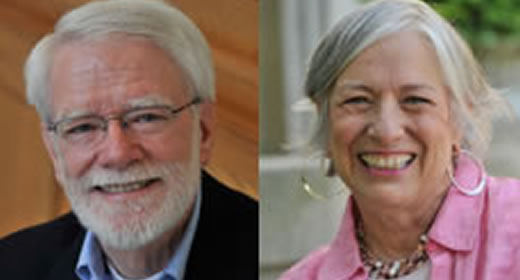
As the semester draws to a close, as John grades his last paper and Elena ties up her final student conference, we congratulate them once again, thanking them for all they've contributed to our Ford School community, and wishing them marvelous retirement adventures.
When John Chamberlin joined the Ford School fresh out of graduate school 42 years ago, he found himself among a group of faculty members and thought-leaders who were revolutionizing what it meant to teach public policy. That group shaped a new public policy curriculum, integrating economics, sociology, political science, and other social sciences, they created the foundation on which our curriculum still rests. During his career, John taught more core courses than any other faculty member at the Ford School, served as associate dean and dean, directed the University's Center for Ethics in Public Life, and launched the Ford School's immensely successful undergraduate degree program. He has also been an indispensable sounding board for faculty, staff, and students—a great listener, with irreplaceable institutional knowledge, wise advice, and the kind of long-view that has helped our school grow and mature in so many ways.
Elena Delbanco has been a treasured member of the Ford School community for 25 years. In addition to writing heaven-only-knows how many wildly entertaining holiday skits, she's tutored hundreds and hundreds of public policy students in expository and persuasive writing, counseled and advised them in work and in life, and formed enduring connections. Elena also solidified the Ford School's Writing Center, a center unusual among our policy school peers, most of which rely on university-wide writing centers rather than offering individualized instruction. Alumni repeatedly credit Elena with helping them acquire communication skills that have advanced their careers and allowed them to advocate successfully for innovative and effective policy solutions. She will be profoundly missed.
Both John and Elena leave an amazing legacy behind. They have launched high-quality academic programs, have cared deeply for Ford School students, have helped those students advance professionally, have maintained ongoing mentoring connections with alumni, and have been a warm and nurturing presence at the Ford School for decades—and we expect to continue to see them around Weill Hall.
We extend best wishes to both as they embark on new adventures in the years ahead.
